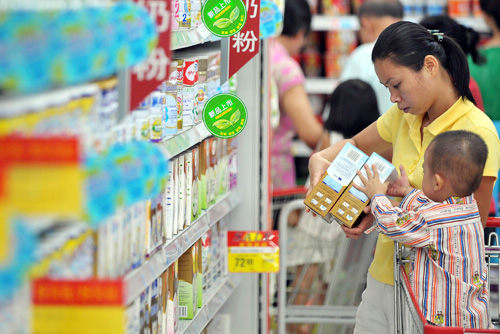|
 |
|
CHOOSING CAREFULLY: A mother reads the introduction of infant formula milk powder in Haikou, capital of Hainan Province (GUO CHENG) |
Yu Linlin, a typical Beijing mother, never takes risks with and always tries to provide the best care for her three-month-old baby. Scrutinizing every decision, from what clothes to put on her baby during the hot summer months to what kind of toys to let him play with, she is never quick to act, but always considering every possibility for her infant. When it comes to baby formula milk, she is particularly cautious—Chinese companies have a tainted reputation for distributing equally tainted products in recent years.
"Each month, my family spends around 800 yuan ($126.4) on formula milk powder. We've decided that Karicare from New Zealand is the best option for our baby," said Yu, adding that a friend in New Zealand sends the milk powder to Beijing about once a month. "I'd never let my little boy drink domestic infant formula powdered milk. It's just too risky and I don't trust them."
Zhao Hong, another average Beijing mom, agrees with Yu. "I only have one child. She's all I have. What if something happens after she drinks domestic substandard formula milk? Who will shoulder the responsibility? I will never take this kind of risk," said Zhao.
Since 2008, China has been rife with food scandals, many involving infant milk formula powders from some of the country's top dairy producers. The result has been a sharp drop in consumer confidence in domestic brands as they look to overseas companies to fill the void.
Losing the market
In 2008, six infants died and about 300,000 others fell ill after drinking melamine tainted milk, according to data released by the Ministry of Health. Former dairy giant Sanlu Group, based in north China's Hebei Province, and 21 other dairy companies were found to have contaminated their products with melamine, a chemical that could cause kidney problems.
The scandals and families' increasing incomes as China develops a middle class have caused many Chinese families to turn to high-end foreign formula milk powder.
China imported 140,000 tons of milk powder in 2008. That amount jumped to 650,000 tons in 2011. To date, the market share of foreign brands has surpassed 60 percent, according to China International Dairy Trade Association.
"In first-tier cities, the market share of domestic brands of formulas is only 2 percent," said Wang Dingmian, Director of Guangzhou Dairy Industry Association.
After the melamine incident in 2008, China's dairy giants, such as Mengniu, Yili and Sanyuan, expanded their production of and investment in formula milk powder. But they are apt to bypass competition against foreign brands in first-tier cities, and choose to explore second-tier and third-tier cities.
With the increasing demand for foreign brands, the price of imported formulas has enjoyed an average increase of 15.5 percent per year for the past six years, although the price of raw materials for the production of infant formula milk powder has been declining continuously, according to People's Daily.
Price hikes have given foreign milk powder producers a higher profit margin in the burgeoning Chinese market. The average gross profit margin of imported formulas has surpassed 50 percent in China, according to a report issued by CIConsulting, a leading industry research institution in China.
"The gross profit margin of foreign formulas can reach 60 percent or 70 percent, and even as high as 80 percent. In comparison, domestic brands can only have a 40-50 percent gross profit margin," said Wang.
In sharp contrast with the prosperity of foreign brands, the market share of China's domestic formula milk producers tanked to less than 40 percent in 2011, against 60 percent prior to the melamine scandal in 2008.
| 